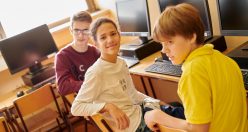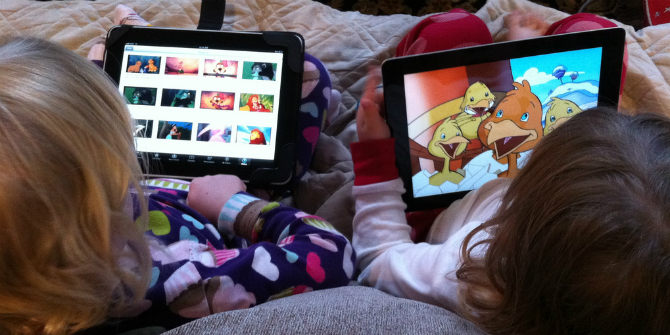Search Global Kids Online
-

Spending time online can boost children’s well-being– depending on their social framework
24th June 2022
Contrary to what many fear, the time children spend in front of a screen is associated with a good quality of life. EU Kids Online findings from media researchers at the University of Oslo indicate that plenty of screen time is a positive rather than a negative thing for children and adolescents with a supportive family and school network.
-

Pathways from offline to online risk: new findings
9th February 2021
Children’s lives are increasingly mediated by digital technologies, yet our knowledge of how this affects their well-being is patchy. Today, UNICEF and LSE are launching our rapid evidence review aiming to identify the pathways to resilience and harm and the factors that can intensify risk or protect children from it. Ensuring children’s well-being and positive engagement with digital technologies requires more attention to long-term consequences and filling the gaps in our evidence, regulation, and education initiatives.
-

Done right, internet use can increase learning and skills
18th February 2020
Blanket restrictions on children’s internet use prevent them from taking advantage of critical learning and skills development opportunities, according to the new Global Kids Online report, launched today at the Internet Governance Forum in Berlin. Produced by the UNICEF Office of Research – Innocenti and the London School of Economics and Political Science (LSE), Growing up in a Connected World compares data on internet use among nearly 15,000 internet-using children in 11 countries across Europe, Africa, Southeast Asia and Latin America.
-

Serbia: children rarely do creative activities online
9th December 2019
Children begin to use the internet at a young age and in a personalised way – from their own mobile devices and away from parental supervision, which has important policy and practice implications, according to a new EU Kids Online report on Serbian children’s internet use launched today. The survey with 1,150 internet-using children aged 9-17 years from 60 schools across the country was co-funded by the University of Oslo, UNICEF and OSCE Serbia, as well as the Serbian Ministries of Education and Telecommunications.
-

Should we include more digital technologies in teaching?
7th November 2019
Montenegro is the first Global Kids Online country to produce comparable data on digital skills including children, parents and teachers. A national survey conducted by Ipsos, supported by UNICEF and Telenor, found that almost all teachers (94%) in Montenegrin primary and secondary schools use the internet on a daily basis. Educators tend to have better digital skills than children and parents. While teachers agree that the use of technologies improves the quality of education, many struggle to integrate diverse ways of using digital media in the learning process.
-

Online on the phone: Czech children’s internet use
5th August 2019
A survey of 2,825 Czech children showed that 84% access the internet daily using their mobile phones and only 45% use a computer. Even the youngest children aged 9 to 10 years use predominantly their phones to go online (64% use it daily), while 29% of all children say that they are online on their mobile ‘almost all the time’. How does this affect their experiences and exposure to risk?
Popular tags








